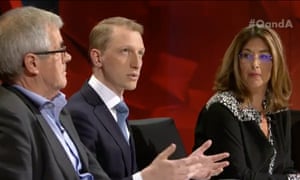Extract from The Guardian
Writer says the
rightwing thinktank is the ‘foremost organ in Australia for
spreading climate change denial and doubt’

Don Watson and Naomi Klein listen to a response from the Liberal senator James Patterson on Q&A on Monday. Photograph: ABC
email
Tuesday
8 November 2016 06.36 AEDT
Naomi
Klein delivered a stinging rebuke to Australia’s approach
refugees and climate change, as well as criticising interventions
from the Institute of Public Affairs, in a fiery episode of ABC’s
Q&A on Monday night.
The
Canadian journalist, author and winner of the 2016 Sydney peace prize
appeared on the panel alongside two panellists from the free-market
thinktank the IPA, Anthony
Albanese and writer Don Watson.
A
dispute on climate change policy was provoked by a question from
audience member Jim Sandford, an economist with the leftwing
thinktank the Australia Institute.
Sandford
asked James Paterson, a Liberal senator and former deputy executive
director of the IPA: “When will your government accept once and for
all the energy system has to change and start to lead that change
rather than standing in the way of it?”
Paterson
responded by saying he thought Australia should “take an agnostic
approach to energy sources”.
Klein
interrupted Paterson and asked, “Do you believe climate change is
real?” to which Paterson said he did. Klein continued: “How can
you be agnostic about which energy source you use if you believe in
that?”
She
continued, laying into the IPA itself:
“I
asked you if you believe in climate change and I asked you that
because you’ve been associated with IPA. We have two people from
this thinktank and this is the foremost organ in Australia for
spreading climate change denial and doubt. You may personally not
agree with that but the IPA publishes discredited climate change
deniers, this year, in your facts book, and this is slowing us down.”
Georgina
Downer, an adjunct fellow at the IPA, responded, saying: “The IPA
is absolutely committed to research and discussion of the facts.”
She then went on to question how settled the science of climate
change is.
Downer
said: “The IPA is, we don’t have an IPA opinion on climate change
per se. We have a committed line of research into the facts.”
But
Klein, who has written widely on the role of free-market thinktanks
and neoliberalism in stopping the world acting on climate change
said: “The reason that free markets thinktanks like IPA are so
determined to raise questions, raise doubts about this issue, where
there is overwhelming scientific consensus that climate change is
real … If it is true, your whole world view collapses. This whole
idea of pushing deregulation and privatisation and ‘government get
out of the way’ falls apart because we need to manage this
decline.”
Klein
said Australia was virtually alone in its inaction on climate change.
“Among
wealthy industrialised countries, Australia now stands alone raising
the middle finger to the world and saying that we’re not going to
act and we will build massive new coalmines, huge natural gas
pipelines in the Northern Territory, opening up vast fracking fields.
These are carbon bombs. This is unburnable carbon. ”
She
said the public “have to stand up to the extraordinary power of
coal, oil and gas”.
Watson,
an author and former speechwriter for prime minister Paul Keating,
had a dry take on the same issue.
“It’s
fairly simple to explain,” he said. “You do have a problem with
the fossil fuel industry. No one wants to take them on. So you don’t.
That’s it.”
Klein
won applause for her rebuke of Australia’s policy on asylum seekers
and refugees also.
Following
a discussion of Donald Trump and his plans to build a wall on the
border wiht Mexico, she said pointedly: “I think that Donald Trump
talking about building the wall with Mexico is insane and racist. But
I think what Australia is doing on Manus and Nauru is as well.”Klein
said: “I think it’s outrageous. The New York Times called this
proposal cruel, short-sighted and shameful. I hear this, I hear this
argument that it’s ‘We can’t send a message to the people
smugglers’. What about the message you’re sending to refugees
around the world? What message are you sending about Australia? And
the implication that the only way people die is at sea. They die in
war zones when they can’t flee. That’s why we welcome refugees.”
No comments:
Post a Comment